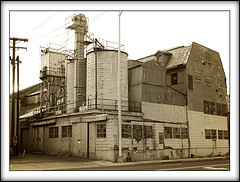We still make lots of stuff in the United States. China is our closest competitor. The two countries are very close at the number 1 and number 2 positions of manufacturing output. In the past decade, manufacturing output in the US has risen by a third. What hasn’t risen is the number of jobs in manufacturing. In the last ten years, those have decreased by a third. About 6 million jobs disappeared.
Adam Davidson of NPR traveled to South Carolina to get a better picture of what has happened. In Greenville, he found shuttered textile plants but found lots of hi-tech factories.
The double shock we’re experiencing now—globalization and computer-aided industrial productivity—happens to have the opposite impact: income inequality is growing, as the rewards for being skilled grow and the opportunities for unskilled Americans diminish.
Its going to get worse for unskilled workers. A factory owner puts it bluntly. He is willing to invest in a machine that will earn back its cost in two years. If a robot can do your job, hope that it costs at least twice your salary.
This all leads back to thinking about the Great Recession that come from the 2008 financial crisis and comparing it to the Great Depression. One theory is that the Great Depression stemmed from the movement from agricultural jobs to manufacturing jobs. It’s starting to look like the Great Recession stemmed from the movement away from manufacturing jobs. We were using residential real estate as a piggy bank to help through the transition, but we eventually broke the piggy bank.
The latest numbers from the end of 2011 show some solid signs of job growth and consumer borrowing is on the rise. it seems clear from Davidson’s story that some of the jobs will never come back. It’s more important than ever to invest in education and training.
Sources:
- Making It in America by Adam Davidson in The Atlantic
- The History Of Factory Jobs In America, In One Town by Adam Davidson on Planet Money
- The Great Depression versus the Great Recession prior post on Compliance Building
- The Book of Jobs by Joseph E. Stiglitz in Vanity Fair
- Chart of Percentage Job Losses in Post WWII Recession from Calculated Risk
- U.S. Manufacturing: Output vs. Jobs Since 1975 by Veronique de Rugy of George Mason University
- November 2011 Employment Situation from the Bureau of Labor Statistics
- Labor Force Exits Are Complicating Unemployment Rate Forecasts by Richard Peach in the Federal Reserve Bank of New York’s Liberty Street Economics blog
- Hard times, lean firms in The Economist
- Race Against The Machine: How the Digital Revolution is Accelerating Innovation, Driving Productivity, and Irreversibly Transforming Employment and the Economy by Andrew McAfee and Erik Brynjolfsson
- Globalization: the irrational fear that someone in China will take your job by Bruce Greenwald and Judd Kahn
Image of a closed factory is by Rubbertoe
![]()

